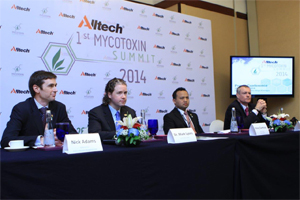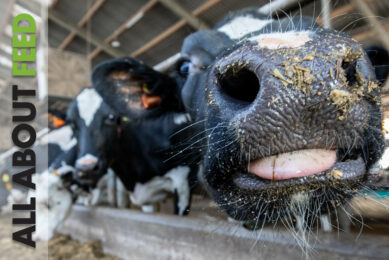Mycotoxin survey reveals 100% toxic feed in Asia

A recent survey of feed produced in Southeast Asia and within that in Indonesia, found 100% of samples tested are contaminated with multiple mycotoxins. Experts revealed the striking data during the 1st Alltech Indonesia Mycotoxin Summit. Over one hundred representatives from Indonesian feed companies and animal producers attending the event looked into a new, holistic approach that help reduce the risks associated with what experts called the “hidden killers”.
As shared during the Summit in Jakarta, over 89 feed and feed raw materials from South East Asia were sampled and tested for the presence of mycotoxins in Alltech’s 37+ Analytical Laboratory in the US. 100% of the samples tested contained at least two mycotoxins while 10-17% contained 6 or more mycotoxins. Fumonisin, Aflatoxin, DON, Fusaric acid and Aspergillus mycotoxin were the predominant mycotoxin groups detected.
Dr. Nattawadee Jantasila, Technical Support, Alltech Mycotoxin Management Team Asia Pacific, spoke about the need for identifying the different contamination areas which negatively affect the animal’s health status. As part of the Mycotoxin Management Programme, Alltech has developed MIKO, a programme designed to help improve production systems on farm and at feed mills by performing an audit, determining the critical control points, establishing critical limits, monitoring procedures, corrective actions, checking procedures and protocols for recording information. “The mycotoxin management team can provide a complete contamination report and recommendations for management and nutritional applications that can assist with mycotoxin prevention and control. By using MIKO, producers can reduce areas of future mycotoxin risk and minimise the impact of existing challenges in animal health and performance. This can lead to a significant increase in profitability,” said Nattawadee.
According to Prof. G. Devegowda, Nutritional Biotechnologist, nutrients play an important role in the protection of the host against invading pathogens. Considerable research has shown that deficiencies of most nutrients impair the immune response and increase susceptibility to diseases. Severe nutrient deficiencies are particularly deleterious to the immune system when they occur early in life. Nutrient deficiencies that are especially damaging to the immune system include selenium, zinc, iron, vitamin A, linoleic acid, amino acids and many more. It is now realised that the presence of low levels of mycotoxins in poultry feed may result in poor performance, impaired immunity, vaccine failure and decreased resistance to infectious diseases.
“The increased demand on animal performance and productivity inevitably brings new challenges and risks to Indonesia’s animal production. Mycotoxins and their impact on the health and performance of animals are inherently linked to these demands, threatening the safety of feed and the security of food supply,” said Hery Santoso, General Manager, Alltech Indonesia. Santoso urged Indonesian farmers and feed millers to use effective mycotoxin management programmes in order to maintain their profitability.












